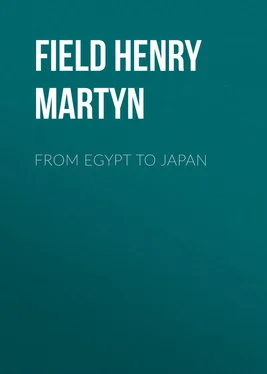Henry Field - From Egypt to Japan
Здесь есть возможность читать онлайн «Henry Field - From Egypt to Japan» — ознакомительный отрывок электронной книги совершенно бесплатно, а после прочтения отрывка купить полную версию. В некоторых случаях можно слушать аудио, скачать через торрент в формате fb2 и присутствует краткое содержание. Жанр: foreign_antique, foreign_prose, Путешествия и география, на английском языке. Описание произведения, (предисловие) а так же отзывы посетителей доступны на портале библиотеки ЛибКат.
- Название:From Egypt to Japan
- Автор:
- Жанр:
- Год:неизвестен
- ISBN:нет данных
- Рейтинг книги:3 / 5. Голосов: 1
-
Избранное:Добавить в избранное
- Отзывы:
-
Ваша оценка:
- 60
- 1
- 2
- 3
- 4
- 5
From Egypt to Japan: краткое содержание, описание и аннотация
Предлагаем к чтению аннотацию, описание, краткое содержание или предисловие (зависит от того, что написал сам автор книги «From Egypt to Japan»). Если вы не нашли необходимую информацию о книге — напишите в комментариях, мы постараемся отыскать её.
From Egypt to Japan — читать онлайн ознакомительный отрывок
Ниже представлен текст книги, разбитый по страницам. Система сохранения места последней прочитанной страницы, позволяет с удобством читать онлайн бесплатно книгу «From Egypt to Japan», без необходимости каждый раз заново искать на чём Вы остановились. Поставьте закладку, и сможете в любой момент перейти на страницу, на которой закончили чтение.
Интервал:
Закладка:
So have I had a little girl as a water-carrier, running close to my saddle all day long, keeping up with the donkey's pace, and carrying a small jar of water on her head, to wash my hands and face, or assuage my thirst, thankful at last for a few piastres as her reward.
We reached Assiout, the capital of Upper Egypt, early Sunday morning, and laid up for the day. While our boat's company were preparing to go on shore to see the town, I mounted a donkey and started off to find the American Mission, which is at work among the Copts, who claim to be the descendants of the ancient Egyptians. I arrived at the chapel in time to hear a sermon and an address to the Sunday-school. As the services were in Arabic, I could not understand what was said, but I could perceive at once the earnestness of the speakers, and the close attention of the hearers. After the sermon there was a baptism. The congregation was a very respectable one both in numbers and appearance. There were perhaps two hundred present, all decently, although some were very poorly clad, and presented a striking contrast to the ragged and dirty people around them. In the quiet and orderly worship, and the songs that were sung, which were Arabic words to American tunes, there was much to make one think of home. There was nothing to distinguish the congregation except the Oriental turbans and dress, and the fact that the women sat apart from the men, separated by a screen, which shows that the seclusion of women is not confined to the Mohammedans. It is an Oriental custom, and is observed by the Copts as well as the Moslems. I am told that even among Christian families here, it is not considered quite "the thing" for women to go abroad and show impertinent curiosity, and that ladies of good position, who are as intelligent as most Orientals, have never seen the Nile, but two miles distant! Such is the power of fashion even in Africa. In the church are several men of wealth, who give freely of their means, as well as use their influence, for its support. The Copts are nominal Christians, although, like most of the Christian sects of the East, they are very ignorant and very superstitious. But they have not the fanatical hatred to Christianity of the Mussulmans. They acknowledge the authority of the Bible, and are thus more open to argument and persuasion. Besides this congregation, the mission has some dozen schools in the surrounding country. In the town itself, besides the schools for the poorest children, it has a boarding-school for those of a better class, an academy which is the beginning of a college, and half a dozen young men are preparing for the ministry. The field is a very hopeful one, and I was assured that the success of the mission was limited only by the means at its disposal.
After visiting the schools, Rev. Mr. Strang accompanied me through the town. It has over twenty-five thousand inhabitants, and is the point of departure for the caravans which cross the Great Desert to Darfour and the far interior of Africa, returning laden with ivory and ostrich feathers, as in the days of King Solomon. We saw in an open square, or market-place, some hundred camels, that, as they lay wearily on the earth, looked as if they might have made the long journey over the trackless sands. Laborers were at work, with no respect for the day, for Friday is the Mohammedan Sabbath; and my friend pointed out, where a number of workmen were building a house, the "taskmaster" sitting on the top of the wall to overlook them, as in the days of the Bible. As we returned by an old portal in the city walls, we found a number of long-bearded and venerable men, who were "sitting in the gate" as "elders" to administer justice. The city gate is the place of honor and of justice now, as it was thousands of years ago.
In the mountain behind the town are a great number of tombs, like those of Beni-Hassan, vast chambers hewn out of the rock ages ago for burial places. We walked along by these silent memorials of the mighty dead, to the summit, from which is one of the most beautiful views of the valley of the Nile. Below the plain is spread out for many miles, well watered like the garden of the Lord, the emerald green coming up to the very foot of the barren hills. But there it ceases instantly, giving place to the desert.
These contrasts suggest some comparisons between the scenery and the climate of Egypt, and our own country. Whoever breathes this balmy air, and looks up to this cloudless sky, must feel that the Lord of all the earth has been bountiful to Egypt. As we read of the winter storms now raging over half of Europe, we bless the more kindly skies that are over us now. But after a few weeks of this dreamy, languid life, one begins to feel the want of something else to stir his blood. He finds that nature in Egypt, like the works of man, like the temples and the pyramids, is a sublime monotony. The landscapes are all the same. There are four or five grand features, the river, the valley, the hills that enclose it, and beyond the boundless desert, and over all the burning sun and sky. These are the elements that enter into every landscape. There is no change, no variety. Look where you will, there is no vision in the distance of lofty peaks dark with pines, or white with snow, no torrents leaping down the mountain side (the silence of Egypt is one of the things that most oppress me), no brooks that run among the hills, no winding paths along their banks that invite the stranger to lose himself in their shade. I see indeed hills on either horizon, but they are barren and desolate. On all this double range, for six hundred miles, there is not a single green thing – not a tree, not a shrub, not a blade of grass, not even a rock covered with moss, only a waste of sand and stone. If you climbed those hills yonder across the valley you would look off upon a boundless plain of sand that stretches to the Red Sea; while behind where we stand is the Libyan Desert, which is only an arm of the Great Sahara, that crosses almost the whole of the continent. In all this waste the valley of the Nile is the one narrow strip of fertility. And even this is parched and burnt up to the very water's edge. Hence the monotony of vegetation. There is not a forest in all Egypt, only the palm groves, which are planted like garden flowers, but no tangled wild wood, no lofty elms, no broad-spreading oaks that cast their grateful shadow on the burning plains. All that variety of nature, with which in other lands she beguiles the weary heart of man, is wanting here. It is indeed the land of the sun, and in that is at once its attraction and its terror, as the fiery orb beats down upon it, withering man and beast, and turning the earth into a desert.
Seeing this monotony of nature, and feeling this monotony of life, one begins to pine after awhile, for a return to the scenes more varied, though more wild and rugged, of his own more northern clime. We hear much of the beauty of a "cloudless sky." It is indeed a relief for a few weeks to those who escape from wintry storms, from bitter winds and blinding snow. But who would have sunshine forever ? The light and warmth are better when softened and subdued by clouds that intercept the overpowering rays. But here the clouds are few, and they do not "return after the rain," for there is no rain. In Lower Egypt there is what may be called a rainy season. In the Delta, as the clouds roll up from the Mediterranean, there is sometimes a sound of abundance of rain. But in Upper Egypt it may be said that it never rains. In Assiout it has rained but three times in ten years! Of course the heat is sometimes fearful. Now it is mid-winter, and the air is comparatively cool and bracing, but in midsummer it reaches 110 and 112 degrees in the shade! For days and nights together the heat is so intense that not a leaf stirs in the palm groves. Not only is there not a drop of rain – there is not a breath of air. This it is to have a "cloudless sky"! Gladly then would our friend exchange for half the year the climate of Egypt for that of America. How refreshing it would be to him to see, just for once, great masses of black clouds gathering over the Arabian Hills, to see the lightnings flash as he has seen them in his native Ohio, and to hear the thunder-peals rolling across the valley from mountain to mountain, and at last dying away on the Libyan desert.
Читать дальшеИнтервал:
Закладка:
Похожие книги на «From Egypt to Japan»
Представляем Вашему вниманию похожие книги на «From Egypt to Japan» списком для выбора. Мы отобрали схожую по названию и смыслу литературу в надежде предоставить читателям больше вариантов отыскать новые, интересные, ещё непрочитанные произведения.
Обсуждение, отзывы о книге «From Egypt to Japan» и просто собственные мнения читателей. Оставьте ваши комментарии, напишите, что Вы думаете о произведении, его смысле или главных героях. Укажите что конкретно понравилось, а что нет, и почему Вы так считаете.












